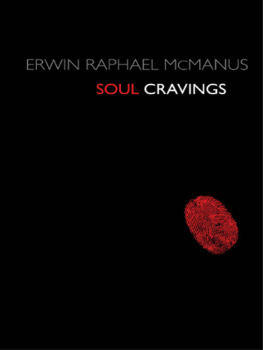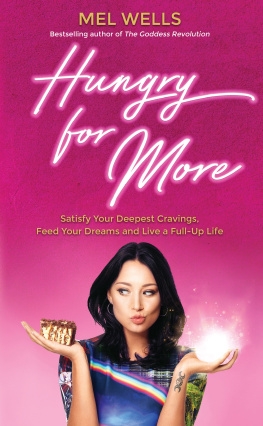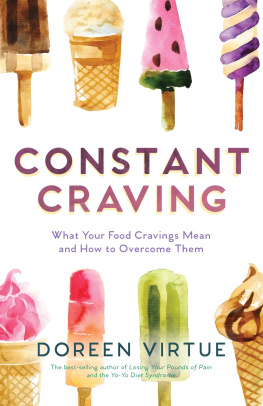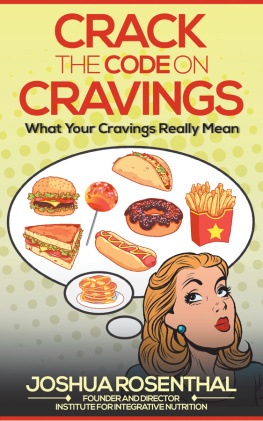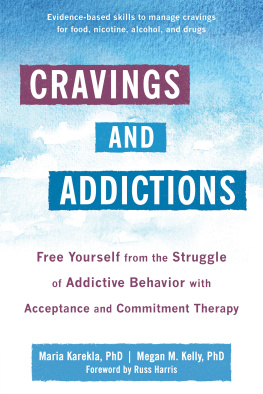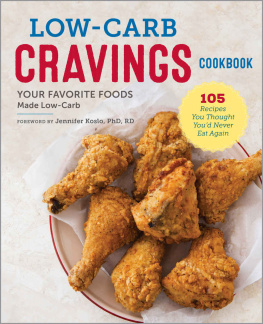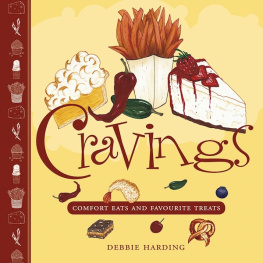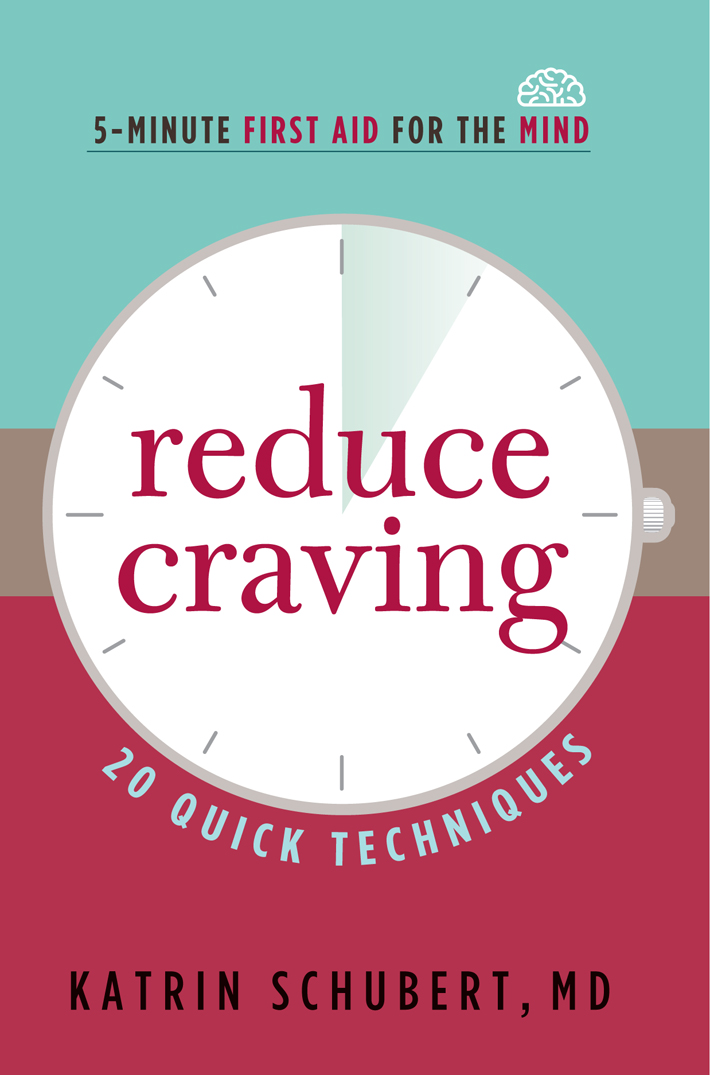

Hazelden Publishing
Center City, Minnesota 55012
hazelden.org/bookstore
2016 by Katrin Schubert
All rights reserved. Published 2016.
No part of this publication, either print or electronic, may be reproduced in any form or by any means without the express written permission of the publisher. Failure to comply with these terms may expose you to legal action and damages for copyright infringement.
Library of Congress Cataloging-in-Publication Data
Names: Schubert, Katrin, 1960- author.
Title: Reduce craving: 20 quick techniques / Katrin Schubert, MD.
Description: Center City, Minnesota: Hazelden
Publishing, 2016. | Series: 5-minute first aid for the mind
Identifiers: LCCN 2015038202 | ISBN 9781616496418
Subjects: LCSH: Compulsive behaviorAlternative treatment.
Classification: LCC RC533.S37 2016 | DDC 616.85/84dc23
LC record available at http://lccn.loc.gov/2015038202
Editors notes
The names, details, and circumstances may have been changed to protect the privacy of those mentioned in this publication.
Alcoholics Anonymous, AA, and the Big Book are registered trademarks of Alcoholics Anonymous World Services, Inc.
Any information in this book is offered for your well-being only and is not intended to diagnose illness, nor is it a substitute for medical care. Please contact your physician or hospital for any health care concerns. If you experience uncontrollable cravings or signs of addiction, please contact skilled professionals for assistance.
Do not use these techniques while driving a car or operating heavy machinery.
20 19 18 17 16 1 2 3 4 5 6
Cover design: Kathi Dunn, Dunn + Associates
Interior illustrations: David Spohn
Author photo: Deb Stagg
Developmental editor: Sid Farrar
Production editor: Heather Silsbee
To Gerda and Philipp
Table of Contents
Guide
CONTENTS

Many years ago I had the pleasure of teaching an earacupuncture program to addiction counselors who worked at the publicly funded Street Health Clinic. The counselors worked with people addicted to street drugs, and the program was designed to treat cravings and detoxification. The clinics clientele consisted of folks whose hard lives were imprinted on their faces, their demeanor, their dress, and their speech. As part of the training, the counselors had invited a number of their clients for a trial treatment at the clinic.
One woman in particular stood out to me. She sat with her friend, the two of them looking older than their age, huddled together for support. After her treatment, the woman took a long, slow breath and relaxed, her eyes softening. This is the most peace of mind I have felt in decades, she said.
From that moment on, I felt even more inspired than before to self-empower peoplenot just addicts, but all people whose cravings are interfering with their ability to live a fulfilling lifeby giving them techniques they can use on themselves and on their friends to find some solace. I believe that every person should have some tools at their fingertips that enable them to help themselves in moments of need, and that one moment of relief will add to the next, allowing them a glimpse of the possibilities ahead.
Understanding Cravings
Most of us experience cravings for pleasurable things such as food, a drink, shopping, or sex. That doesnt mean we are addicted to those substances or behaviors. Cravings are natural and only become a problem when were unable to control them and they negatively affect our well-being and quality of life. This can happen on a spectrum, from
periodic cravings that we give in to every so often resulting in few or no problems, to
compulsions that we surrender to on a regular enough basis that we experience some negative consequences (such as weight gain from eating too many sweets or maxing out our credit card from overspending), to
full addiction, when the craving for the substance or behavior takes over our lives and we need professional help.
There are many reasons we experience cravings and feel the need to give in to them. A craving can feel like a physical need at times, and sometimes the body is expressing some biological deficiency. Usually, however, our cravings arise out of psychological distress and the need to medicate uncomfortable feelings such as anxiety, anger, boredom, sadness, or loneliness.
One thing, however, is always true: when we have an uncontrollable need to indulge to the point that our behavior becomes a bad habit or full-blown addiction, we always feel cut off from our inner self, from the best that we can be and the full manifestation of our talents. We feel fragmented and experience a void we think we have to fill in order to feel whole again. In many ways, we in the Western world are an addicted society. Our fast-paced and ungrounded lifestyle messes with our brains, pushing us to indulge in mood-altering behaviors to soothe the eternal and instinctual search for fullness.
This book is designed to be used as a first-aid kit of techniques that can self-empower you to find more natural, healthful ways to soothe yourself. Whether you are in active counseling, a recovery program, or just want to instill healthier habits into your life, these techniques can be a valuable additional source of support. They can serve as a Band-Aid for the moment until you can get more support if you need it, and if used over time, they can help promote balance in your life. However, this book does not replace rehabilitation, counseling, or medical treatment. Only you can decide how much more assistance you need to reduce or free yourself from cravings.
How to Use This Book
You may want to work through the twenty techniques in order, or you may choose to spontaneously open the book to techniques that look appealing and try those first. No matter which approach you fancy, I recommend you try every technique at least once, settle on your favorite ones, and turn them into habits. The more you practice the techniques, the more you will remember them later on when you feel the need for support.
Each of the techniques collected in this book takes approximately five minutes to do. You may decide to apply a technique for a longer time or repeat the techniques several times each day. Some of the exercises take a little more time to prepare. But once you have spent ten to fifteen minutes making one of the lists or trying a more involved technique, you will be able to apply them in five minutes as they will become second nature.
Cravings are often related to stress, and youll find a few of the techniques in this book are also recommended in another 5-Minute First Aid for the Mind title, Relieve Stress.
The 5-Minute First Aid for the Mind techniques have been tested and applied by thousands of people with good results. I have collected them and used them with my clients over the past twenty-some years as well as test driven them myself.
May they help you on your journey!


Next page

